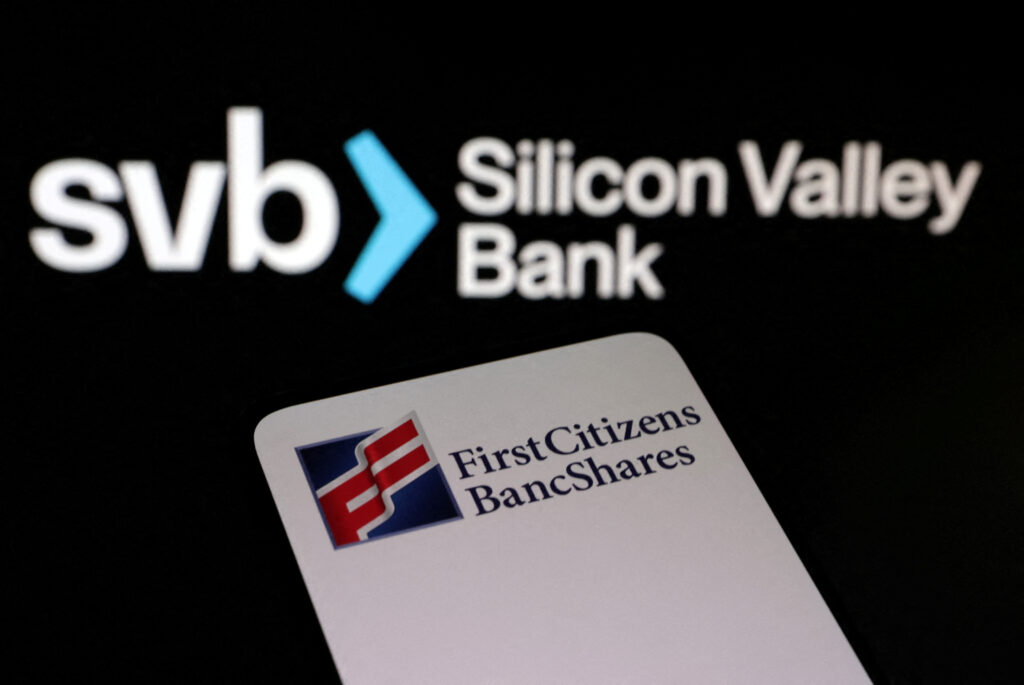March 27 (Reuters) – U.S. regulators said on Monday they would backstop a deal for regional lender First Citizens BancShares to acquire failed Silicon Valley Bank, triggering an estimated $20 billion hit to a government-run insurance fund.
The deal comes after the Federal Deposit Insurance Corporation (FDIC) took over Silicon Valley Bank on March 10 after depositors rushed to pull out their money in a bank run that also brought down Signature Bank and wiped out more than half the market value of several other U.S. regional lenders.
The deal was “momentous” for First Citizens, CEO Frank Holding told investors on a conference call Monday. “We believe this transaction is a great outcome for depositors.”
The Raleigh, North Carolina-based lender has completed 21 such government-assisted deals, including 14 since 2009 when CEO Holding was made chairman, according to a Piper Sandler note on Monday.
The FDIC fund does not take U.S. taxpayer money and is instead replenished by a levy on member banks.
“The FDIC’s sale of SVB helps show business can go on as usual for the banking industry,” a team of Wells Fargo analysts led by Mike Mayo said in a note on Monday.
First Citizens will not pay cash upfront for the deal. Instead, it said it granted equity appreciation rights in its stock to the FDIC that could be worth up to $500 million — a fraction of what Silicon Valley Bank was worth before it failed.
The FDIC will be able to exercise these rights between March 27 and April 14. How much cash it receives will depend on the value of First Citizens’ stock.
First Citizens shares jumped 50%.
First Citizens will assume Silicon Valley Bank’s assets of $110 billion, deposits of $56 billion and loans of $72 billion as part of the deal.
The FDIC said the $72-billion purchase of SVB’s assets came at a discount of $16.5 billion.
SVB Private, which the FDIC was trying last week to sell separately and that Citizens Financial Corp had expressed interest in, was acquired by First Citizens as well.
First Citizens said SVB’s Private wealth business “is a natural fit for our high-touch and sophisticated level of high-net-worth customer service and approach.”
LINE OF CREDIT
First Citizens will also receive a line of credit from the FDIC for contingent liquidity purposes and will have an agreement with the regulator to share some losses on commercial loans to protect it against potential credit losses.
“First Citizens Bank’s acquisition of the SVB loan book and deposits does not add much to solve the number one issue that the U.S. banking system is now facing: deposits leaving smaller banks for larger banks or money market funds,” said Redmond Wong, greater China market strategist at Saxo Markets.
Based in Santa Clara, Silicon Valley Bank was the 16th biggest lender in the U.S. at the end of last year, with about $209 billion in assets.
SVB’s collapse triggered the worst banking crisis since 2008, pummelling banking stocks globally. Shares in European lenders fell sharply on Friday, led by Germany’s Deutsche Bank, raising concern among authorities about a potential credit crunch.
Shares of U.S. banks – both large and mid-sized – climbed on Monday.
VENTURE CAPITAL BUSINESS
SVB customers will continue to be able to access their accounts through websites, mobile apps and branches, First Citizens said. Employees in the acquired businesses will be retained, it added.
The deal will accelerate First Citizens’ expansion in California and give it wealth management capabilities in the northeast U.S., First Citizens said.
“We are committed to building on and preserving the strong relationships that legacy SVB’s global fund banking business has with private equity and venture capital firms,” Holding said in a statement.
First Citizens has around $109 billion in assets and total deposits of $89.4 billion. The combined company will have total assets of $219 billion and $145 billion of deposits, according to a First Citizens presentation.
“The FDIC estimates the cost of the failure of Silicon Valley Bank to its Deposit Insurance Fund (DIF) to be approximately $20 billion. The exact cost will be determined when the FDIC terminates the receivership,” it said.
That is on top of the $2.5 billion loss to the fund the FDIC incurred when it sold Signature Bank to New York Community Bancorp one week ago.
The loss will be “handled solely by the banking industry,” bringing the fund to around a third below its statutory minimum, Wells Fargo analysts said.
Approximately $90 billion in securities and other assets from SVB will remain in receivership for disposal, the regulator added.
(Reporting by Scott Murdoch in Sydney and Mehnaz Yasmin in Bengaluru; Additional reporting by Xie Yu and Selena Li in Hong Kong, Jahnavi Nidumolu, Tommy Reggiori Wilkes in London and Lananh Nguyen in New York; Editing by Edwina Gibbs, Lananh Nguyen and Nick Zieminski)
Reporting by Susan Mathew and Amruta Khandekar in Bengaluru and Pete Schroeder in Washington
Additional reporting by Maria Ponnezhath in Bengaluru, Anirban Sen in New Orleans, Joice Alves in London and Renju Hose in Sydney and Noel Randewich in Oakland, California
Writing by Tom Westbrook, Toby Chopra and Deepa Babington
Editing by Nick Zieminski and Matthew Lewis
: .


